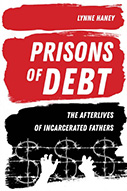Prisons of Debt: The Afterlives of Incarcerated Fathers

Author: Lynne Haney
Publisher: University of California Press, 2022. 376 pages.
Reviewer: Nicole Jenkins | December 2022
In this gripping ethnographic study, Lynne Haney brings us into the worlds of fathers who are grappling with an entanglement of issues within institutions that function on structural racism and punish the poor. She highlights the unique experiences of men who encounter the criminal justice system in combination with child support initiatives that complicate their experiences and lead to crippling and impossible debts. Each chapter provided more details about how these systems operate in ways that complicate circumstances for indebted parents and their families. Prisons of Debt captures the inconsistencies and complexities associated with incarceration and child support debt by providing accounts from fathers often misinformed about available options and required processes for managing debts. Lynne Haney untangles just how child support policies impact incarcerated parents and are responsible for child support debts – describing this as debt imprisonment. Using vivid ethnographic accounts, the author demonstrates the confusion among indebted fathers as they navigate court systems for which processes and procedures are frustratingly and inevitably unfamiliar.
Lynne Haney has written this book in an accessible way that allows even those unfamiliar with the criminal justice system to easily understand the innerworkings of a complexly, broken process. She begins by providing necessary socio-historical and socio-political context around the issue of child support in the United States. She describes how changes in how Americans began to understand child support came at a cost to low-income parents and, more specifically, incarcerated fathers.
In the section Making Men Pay, the author lays out the political climate of welfare and child support reform in the U.S., demonstrating both as instrumental in the power dynamics associated with debt collection for child support. Fathers who represent the largest group of debtors in child support were initially responsible to mothers for child support and repayment. Political climates that emphasized the need to hold fathers accountable for their families led to the state’s involvement. Transitions to state enforcement later escalated to federal oversight that held debtors accountable for poor families’ assistance (i.e., Medicaid, SNAP, etc.).
The most notable influence on the vicious rise in debts for child support was perhaps the enforced repayment for the aid that families received from the state and federal government. This caused debts to stack up in ways that left poor fathers with few options for dismantling their debt. In just a decade, the categories of state support, child support, and earnings began to transition in ways that negatively impacted poor families, with state support shrinking as child support rose for populations that are most vulnerable to repayment and other financial insecurities. These debts were framed in ways that criminalized those who owed because the public framing and political climate painted debtors as the borrowers from the states that steal from the public. This transition led to the general public criminalizing of child support debtors.
This experience was starkly different depending on the state where the debt was initiated and the debtor’s resident state. For example, some states classified incarceration as “involuntary employment,” forcing incarcerated parents to pay to ensure debts while serving sentences. Other states had varying modifications for incarcerated parents and varying payment requirements. Interest rates additionally cause debts to climb to unattainable repayment options, especially for low-income parents. The author provides significant context for how changes in state enforcement across the nation and federal enforcement have created a complex and diabolical debt situation for U.S. parents responsible for child support debt.
Perhaps the most compelling was Haney’s description of court appearances as the first and most significant example of how incarcerated feathers, due to their inability to appear for their cases, are penalized in this process from the start. Orders processed without the presence of parents often make varying assumptions about parents’ lives and, more notably, their incomes – creating orders that do not correspond with the circumstances of parents responsible for paying child support. This creates a host of problems for incarcerated parents, whose incomes are often calculated based on records of previous employment, rather than the wage-potentials of incarcerated persons.
Another issue raised is for fathers who informally contributed to their children before incarceration. These parents’ incarceration can lead to an increased need for state support for mothers taking full responsibility for the care of children in their absence, which is a brewing storm for the incarcerated parent. Incarcerated parents begin to acquire unrealistic debts while simultaneously are unable to acquire suitable wages to repay. The author documents the court’s push to encourage women to defer from public assistance and the racialized tactics in dealing with mothers needing financial support. For example, courts have been instrumental in persuading primarily women of color to opt for child support over state support, regardless of whether or not it may be the most advantageous option for the family.
But not all incarcerated parents were unable to appear; some were able to navigate the complexities associated with appearing via phone. These appearances were harshly stigmatized, and judges appeared to have little patience for any complications parents might encounter trying to “appear.” Most notably, the author demonstrates how code-switching remains a challenge many inmates encountered. The presence of other incarcerated men have left fathers with the challenge of navigating masculinity and respect as a way to maintain protection. While this persona may be successful for an incarcerated environment, it is quite the opposite for court “appearances” and can often leave inmates vulnerable to even more stigma.
Notably intersectional, this book brings into conversation issues of race, class, and gender in order to provide an in-depth account of the unique institutional experiences of this marginalized population. I would like to have seen a more in-depth dialogue around “insider-outsider” status and how Haney managed her identity as a white woman of a different social class while interviewing men of color. Additionally, I am curious how her status as a parent or non-parent influenced her research experience.
Overall, Prisons of Debt: The Afterlives of Incarcerated Fathers is a fantastic ethnography that provides insight into the experiences of incarcerated fathers at the intersections of the criminal justice and child support systems. Lynne Haney has navigated readers through the institutional bureaucracy that leaves these fathers’ lives in shambles and bleeds into their lived experiences far beyond their incarcerations. Her intention to give voice to these fathers and center their experiences is remarkably done.
Nicole Jenkins is an Assistant Professor at Howard University.


